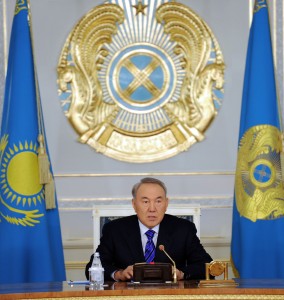 ASTANA – President Nursultan Nazarbayev reviewed what still needs to be done to implement the Kazakhstan 2050 Strategy at the Feb. 14 government meeting as ministers reviewed economic situation and socioeconomic development plans in light of the Feb. 11 readjustment of the tenge exchange rate.
ASTANA – President Nursultan Nazarbayev reviewed what still needs to be done to implement the Kazakhstan 2050 Strategy at the Feb. 14 government meeting as ministers reviewed economic situation and socioeconomic development plans in light of the Feb. 11 readjustment of the tenge exchange rate.
The President stressed that amid volatility in world markets, Kazakhstan’s economy grew by 6 percent in 2013. This year, however, will be challenging, he said, and concerted action will be needed to meet those challenges.
“In October 2013, I gave 33 orders, only 11 of which were fully executed,” Nazarbayev said. “The government and the National Bank have not proposed steps to attract resources from development institutions, pension funds and financial organisations for public-private partnership projects. Practically nothing has been done to reduce the shadow economy; there is no clear vision in replenishing of local government revenue sources; agriculture and many more areas were not attended to, without which there is no proper fulfilment of instructions given in my state-of-the-nation address.”
The correction of the exchange rate of tenge announced by the National Bank three days prior will ensure 6 percent economic growth, the main indicator in the achievement of all major goals and tasks, the President said, and, given the trends in the global economy and the domestic situation, preventive measures are very important for maintaining macroeconomic and social stability.
The economy and the people must be supported, Nazarbayev said. The government should ensure stable prices for basic essentials, fuel and medicines, and prevent shortages of products and the unfair growth of monopolists’ tariffs. He instructed the government to raise public employees’ monthly wages by 10 percent from April 1, primarily for those working in education, science, health care, culture, sports and social welfare. Given the additional increase, by July 1, 2015, their wages will have grown from between 36 to 52 percent. Pension payments are to be raised by 14 percent, social benefits by up to 12 percent, targeted social assistance by 12 percent and student scholarships by 10 percent. The government was also ordered to review and, if necessary, correct the budget.
The National Bank and the government were tasked with averting a surge of inflation. To reduce inflation to 3-4 percent in the medium term, the National Bank and the government will work out steps for the transition to an inflation targeting regime by March 15 and define a policy for regulated prices and tariffs by the end of this year.
“We also lack drastic measures to revive the stock market. The People’s IPO has no follow-up. The creation of a single pension fund is long overdue,” Nazarbayev said.
The government needs to radically revise the permit system and simplify administrative procedures, he said. Non-performing banking loans must be addressed, and the government and the National Bank have been ordered to work out ways by March 1 to repurchase bad loans from banks. The share of non-performing loans in second-tier banks must fall to 15 percent by Jan. 1, 2015, and to 10 percent by Jan. 1, 2016. The President asked to allocate 1 trillion tenge (US$5.4 billion) from the National Fund in 2014 and 2015 to provide the economy with credit resources.
Stability and openness must be another area of focus, Nazarbayev said, and state involvement in the economy must be reduced. All companies partially owned by the state will be reviewed and a list drawn up of those to be transferred to the private sector. A clear list of terms and procedures will be made for a possible state share in private companies. All in all, by 2020, the state share in the economy should be brought to the level of the OECD nations – 15 percent of GDP [gross domestic product].
Improving the investment climate is also crucial, the President said. The government was instructed to cut down administrative procedures in foreign trade and customs in particular.
“Measures to reduce the shadow economy are to be worked out by March 15. Investment climate needs improvement too. Investors are interested in stability of contracts and of the legislation, social stability, good infrastructure, energy, transport, labour resources, easy visa regime. We have all that, but it does not work properly, and if it does, it is not in favour of the investors,” the President opined.
The government was tasked with ensuring the stability of investment agreements and contracts and building the transport-logistics sector of the international level and pool national logistics assets to forge alliances with partners through the Kazakhstan Temir Zholy national railway company.

The government and the akimats are tasked with making sure there are no price hikes for main food staples and other goods in light of the 19-percent correction of the tenge versus dollar exchange rate on Feb. 11.
The third focus is developing competitive advantages through economic diversification in the medium and long term. “The aim of industrialisation is not to collect disparate projects, but to develop a strong manufacturing industry. The government should get down to work with leading companies producing oil and gas and mining and agricultural machinery to seek out investors willing to open plants in our country and support them in every way,” Nazarbayev said.
The President expressed concern about insufficient investment in geo-exploration and pointed to the need to significantly intensify technological policy in the oil and gas sector. In Kazakhstan, the oil recovery index is about 30-35 percent, while it is 50 percent elsewhere in the world. Kazakhstan should reach 50 percent by 2020, he said, and develop concepts for developing gas, fuel and other energy sectors. More research must also be done on using renewable water, land and biological resources, the head of state said.
Finally, investment must be drawn to agribusiness. The government will develop and adopt a by-the-region specialisation map for the optimal use of agricultural lands.
Reporting on the socioeconomic development of the country, Prime Minister Serik Akhmetov said that the volatile economic situation in the world led to a drop of 4.6 percent in Kazakhstan’s exports. Unemployment held at 5.2 percent, however, and investment in fixed assets rose by 6.5 percent, he said.
The government’s priority is laying the groundwork for meeting the long-term objectives of the Kazakhstan 2050 Strategy. The seven priority areas are the modernisation of the economy, the development of infrastructure and energy, the development of enterprise, balanced regional development, social modernisation and employment, state management and the development of international integration and economic cooperation.
The main objectives of the government in trade policies are completing the process of accession to the World Trade Organisation (WTO) and preparing the Treaty on the Eurasian Economic Union.
National Bank Chairman Kairat Kelimbetov reviewed monetary policy in the wake of the exchange rate adjustment. The measure, he said, will promote growth, primarily for Kazakhstan’s exporters, such as those in the petroleum and mining and metallurgical businesses. It will also stimulate other sectors of economy, which in turn will accelerate GDP growth and bring more revenues to the state budget. The improved trade balance through the increase of exports and decrease of imports will then positively impact GDP growth.
No sharp surge of inflation is expected, Kelimbetov vowed, but the bank does not rule out the formation of inflation expectations due to excessive demand for certain commodities in the consumer market. These effects will be short-lived, he said.
It is inflation, not the exchange rate, that affects peoples’ welfare, Kelimbetov said. He proposed tightening controls over monetary and non-monetary factors in pricing, and said Kazakhstan needed to avoid an oversupply of money in the economy.
Economy and Budget Planning Minister Yerbolat Dossayev said that in the wake of the exchange rate adjustment, GDP was still projected to grow by 6 percent. Nominal GDP is set to grow by 6.5 percent to reach 41.1 trillion tenge (US$222.7 billion).
According to Dossayev, the existing risks prompted the following priorities in 2014: sustaining economic growth at 6 percent; fiscal policy and planning, including a package of amendments to the Budget Code; further improvement of the state planning system; increasing the efficacy of public administration; strengthening the financial autonomy of local governments and increasing local authorities’ responsibility for end results.
Regarding labour and social protection, state support will focus on the integrated development of villages with high potential and the creation of new jobs there.
According to Minister of Labour and Social Protection Tamara Duissenova, in 2015, 80 percent of budget funds allocated to the regions will be distributed to the population and 20 percent according to the results of the given region’s progress. Forming a new generation of professionals is among the priorities for the country. New professional standards are being created and the qualification system updated. The pension system is also being upgraded and will be finished in September 2014.
The President instructed regional authorities to help villagers start their own businesses and to provide microloans for them.
Akims (governors) of the Mangistau region Alik Aidarbayev, East Kazakhstan region Berdybek Saparbayev, North Kazakhstan region Samat Yeskendirov, and Almaty region Ansar Mussakhanov also reported on the current socioeconomic situations in their regions.
